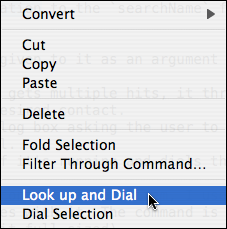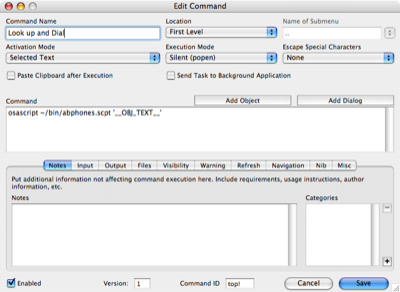Contextual menu to dial by name
February 28, 2007 at 10:20 PM by Dr. Drang
This is the third and last in my series of phone-dialing posts. The first two are here and here. Today, I’ll be showing how I combined AppleScript and On My Command to create a contextual menu item that takes a name you’ve selected in any application, looks it up in the Address Book, and dials its phone number through the modem. As with the last two posts, today’s script requires the excellent dialModemOSAX scripting addition from Javier Díaz Reinoso.
Here is the AppleScript. I call it abphones.scpt and keep it in my ~/bin folder.
property areaCode : "630"
property longDistance : "1"
property myModem : "/dev/cu.usbmodem"
-- change all letters to digits, strip punctuation,
-- and standardize pauses to ~
on translateNumber(num)
set pipeline to "echo " & quoted form of num & ¬
" | tr 'a-z' 'A-Z'" & ¬
" | tr 'A-Z' '22233344455566677778889999'" & ¬
" | tr ',' '~'" & ¬
" | sed 's/[^0-9~]//g'"
return do shell script pipeline
end translateNumber
-- return the numbers you actually dial
on makeDialable(num)
set tnum to translateNumber(num)
-- strip prefix and area code from local numbers
if length of tnum is 11 ¬
and characters 1 thru 4 of tnum as string ¬
is (longDistance & areaCode) then
set tnum to characters 5 thru 11 of tnum as string
end if
-- handle all 10-digit numbers
if length of tnum is 10 then
-- strip area code from local numbers
if characters 1 thru 3 of tnum as string is "630" then
set tnum to characters 4 thru 10 of tnum as string
else -- add prefix to long distance numbers
set tnum to longDistance & tnum
end if
end if
return tnum
end makeDialable
on searchName(theName)
tell application "Address Book"
set nameWords to every word in theName
set personList to every person whose name ¬
contains the first item of nameWords
repeat
if the length of nameWords = 1 then
exit repeat
else
set newPersonList to {}
set nameWords to rest of nameWords
repeat with p in personList
if name of p contains first item of nameWords then
set end of newPersonList to p
end if
end repeat
set personList to newPersonList
end if
end repeat
return personList
end tell
end searchName
on run argv
-- initialize the data
set contacts to searchName(item 1 of argv)
set workPhone to ""
set homePhone to ""
set cellPhone to ""
set phList to {}
-- handle the case of multiple hits
if length of contacts > 1 then
tell application "Address Book"
set nList to {}
set i to 1
repeat with c in contacts
set end of nList to (i as string) & ": " & name of c
set i to i + 1
end repeat
end tell
tell application "System Events"
activate
set whichPerson to choose from list nList with prompt ¬
"Which \"" & (item 1 of argv) & "\" are you looking for?"
end tell
if whichPerson is false then
return
end if
set whichPerson to first item of whichPerson
set astid to AppleScript's text item delimiters
set AppleScript's text item delimiters to ": "
set cIndex to (first item of text items of whichPerson as string)
set AppleScript's text item delimiters to astid
set contact to item cIndex of contacts
else
set contact to item 1 of contacts
end if
-- get the canonical name and the phone numbers
tell application "Address Book"
set fullName to name of contact
set dScript to "display dialog \"Dial which number for " & ¬
fullName & "?\" buttons ["
set allPhones to every phone of contact
repeat with ph in allPhones
set end of phList to (label of ph) & ": " & (value of ph)
end repeat
end tell
-- ask the user which number to call
tell application "System Events"
activate
set whichNum to false
set whichNum to choose from list phList with prompt ¬
"Dial which number for
" & fullName & "?"
end tell
if whichNum is false then
return
end if
set whichNum to first item of whichNum
set astid to AppleScript's text item delimiters
set AppleScript's text item delimiters to ": "
set phoneNumber to second item of text items of whichNum as string
set AppleScript's text item delimiters to astid
-- prepare the number for dialing
set phoneNumber to makeDialable(phoneNumber)
-- pause iTunes if it's running
try
do shell script "ps acx | grep 'iTunes$'"
tell application "iTunes" to pause
end try
-- dial it
initModem myModem with "^MAT&F1E0S7=45S0=0L2^M"
--was "~^M~AT&F1E0S7=45S0=0L2^M"
dial modem "ATDT" & phoneNumber
delay 3
hang up
end run
It uses the translateNumber and makeDialable functions described here and a slight modification to the searchName function described here. What is does is:
- It takes the name given to it as an argument and searches the Address Book for that name.
- If the name search gets multiple hits, it throws up a dialog box asking the user to choose the desired contact.
- It throws up a dialog box asking the user to pick which of the contact’s phone numbers to dial.
- It pauses iTunes if it’s running and dials the number.
To turn this into a contextual menu item, I use On My Command and the OMCEdit application that comes with it. The command is created this way (you can click on the image to see it full-sized).
Once this is saved a “Look up and Dial” item shows up in the contextual menu whenever some text is selected. I use it mostly to call people mentioned in emails and in my text-file-based notes. Beats the hell out of doing it by hand.


